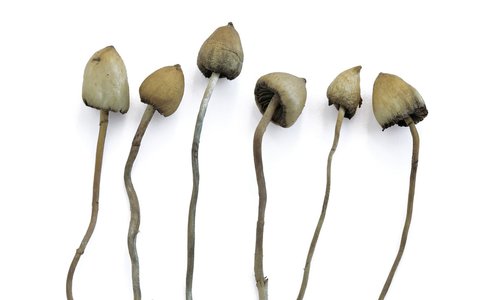New Study Sheds Light On Magic Mushrooms' Role in Treating Depression

Recent evidence indicates that psilocybin with psychological support may be effective for treating depression.
Psilocybin is the primary mind-altering substance in psychedelic “magic” mushrooms. The substance can profoundly alter the way a person experiences the world by producing changes in mood, sensory perception, time perception, and sense of self.
The new study, published in the scientific journal Neuropharmacology found that depressed people had increased neural responses to fearful faces one day after a psilocybin-assisted therapy session, which positively predicted positive clinical outcomes.
“I believe that psychedelics hold a potential to cure deep psychological wounds, and I believe that by investigating their neuropsychopharmacological mechanism, we can learn to understand this potential,” explained study author Leor Roseman, a PhD student at Imperial College London.
In this open-label study, 20 individuals diagnosed with moderate to severe, treatment-resistant depression, underwent two separate dosing sessions with psilocybin. Psychological support was provided before, during and after these sessions and 19 completed fMRI scans one week prior to the first session and one day after the second and last. Neutral, fearful and happy faces were presented in the scanner and analyses focused on the amygdala.
Group results revealed rapid and enduring improvements in depressive symptoms post psilocybin. Increased responses to fearful and happy faces were observed in the right amygdala post-treatment, and right amygdala increases to fearful versus neutral faces were predictive of clinical improvements at 1-week.
The team found that depressive symptoms were significantly reduced in all patients at one week, and 47% showed a response at five weeks. There were decreases in blood flow to the temporal cortex, including the amygdala, and area associated with emotion processing, which correlated with the reduction in depressive symptoms.
Psilocybin with psychological support was associated with increased amygdala responses to emotional stimuli, an opposite effect to previous findings with SSRIs. This suggests fundamental differences in these treatments’ therapeutic actions, with SSRIs mitigating negative emotions and psilocybin allowing patients to confront and work through them.
Based on the present results, the team proposed that psilocybin with psychological support is a treatment approach that potentially revives emotional responsiveness in depression, enabling patients to reconnect with their emotions.
The Vienna Convention of 1971 suggested a scheduling system for all agreeing countries to adhere to, classifying drugs into categories of harm. 183 countries have now agreed to this convention, and it directly led to the creation of laws such as the US Psychotropic Substances Act and the UK’s Misuse of Drugs Act.
The Vienna Convention was designed to target the manufacturing of synthetic psychotropics like LSD and MDMA; however, psilocybin is a naturally occurring substance. Similarly to the legal status of the natural psychedelic ayahuasca, the legal status of psilocybin can be left up to interpretation in many countries, even those that are party to the Vienna Convention.
Despite this, most countries have decided to treat psilocybin as a schedule I drug, imposing the harsh punishments for its possession and sale.
Hi! I am a robot. I just upvoted you! I found similar content that readers might be interested in:
https://thethirdwave.co/legality-psilocybin-mushrooms/
Mushlove!